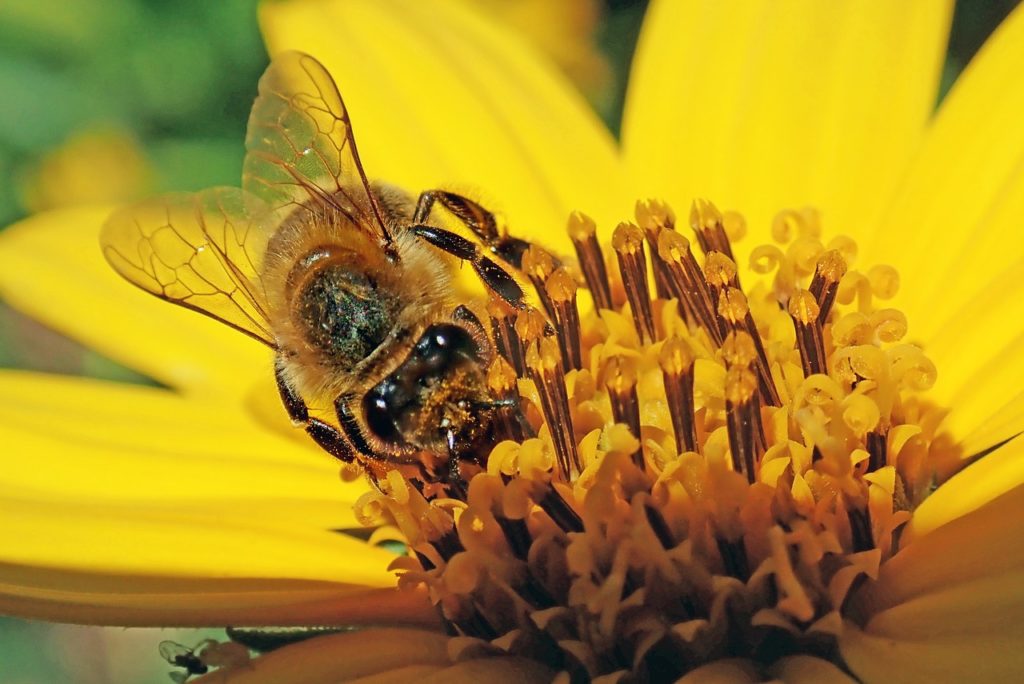What is Bee Pollen?
Bee pollen is a ball of pollen made by young bees when they land on a flower. It’s a mixture of pollen, saliva, and nectar or honey. Bees carry these balls back to the hive in sacs on their legs and store them in the hive’s honeycomb. The pollen then ferments into “bee bread,” which feeds a bee colony.
Beekeepers collect pollen from bees by keeping a thick comb in the entrance of their hives. When bees pass through it, it knocks the pollen off their legs into a collection bin below. The bees then must go out to collect more pollen.
Bee pollen is considered so beneficial that the German Federal Board of Health recognizes it as medicine. Advocates are quick to tout the benefits of this so-called superfood, saying it can:
- Relieve inflammation
- Work as an antioxidant
- Boost liver health
- Strengthen the immune system
- Work as a dietary supplement
- Ease symptoms of menopause
- Reduce stress
- Speed up healing


Relieving inflammation
Bee pollen may work similarly to anti-inflammatory drugs, according to researchers. Scientists found that bee pollen extract reduced inflammation in rats with swollen paws.
Working as an antioxidant
Researchers have found that bee pollen has very high antioxidant properties similar to those of fermented foods. Antioxidants are naturally occurring chemicals that exist in plant-based foods, usually those that are red or dark in color, as well as fermented foods.
Antioxidants keep people healthy by counteracting oxidants such as air pollution and cigarette smoke that can damage the body.
Boosting liver health
The liver is responsible for filtering toxins out of the body. Researchers found that in rats, bee pollen helps keep the liver healthy and can even help the healing process after liver damage.
Researchers noted that the rats had no side effects in taking bee pollen, compared to silibinin, a medication that also contains antioxidants but can also cause harm.
Strengthening the immune system
A strong immune system is necessary for fighting off disease and keeping you healthy. One study found that bee pollen naturally inhibits allergic reactions in mice. Another study suggests that bee pollen has antimicrobial, antifungal, and antiviral properties. These properties could help kill off bacteria and viruses, such as staphylococcus aureus, which causes food poisoning.
Working as a dietary supplement
Bee pollen could potentially work as a supplement that helps your diet and health. One study looked at rabbits that received a bee pollen supplement in addition to their regular diet. They had a longer lifespan and also greater reproductive success. They gave birth to healthier, stronger babies compared to rabbits who didn’t take the supplement.
Another study found that malnourished, old rats experienced improved muscle mass and metabolism after eating a diet that contained bee pollen.
Easing symptoms of menopause
Many women who take antihormonal medications often experience symptoms of menopause. One study found that some women with breast cancer who took a bee pollen supplement experienced fewer, less intense menopause symptoms than those who didn’t.
Reducing stress
Bee pollen can increase blood flow to the body’s nervous system, helping reduce stress. It’s also effective for tiredness.
Speeding healing
Bee pollen can be used on the skin to speed healing, as it boosts blood circulation, kills bacteria, and moistens the skin.

